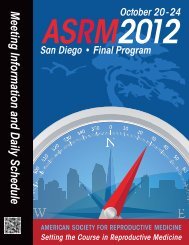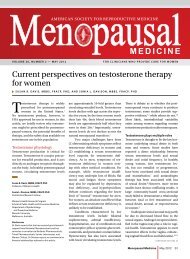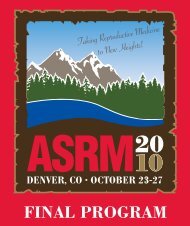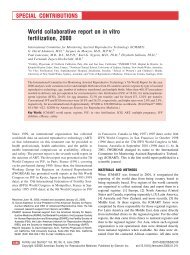scientific program • symposia - American Society for Reproductive ...
scientific program • symposia - American Society for Reproductive ...
scientific program • symposia - American Society for Reproductive ...
You also want an ePaper? Increase the reach of your titles
YUMPU automatically turns print PDFs into web optimized ePapers that Google loves.
MAKING AN IMPACT<br />
Alicia Armstrong, M.D. (Chair)<br />
Eunice Kennedy Shriver National Institute of Child Health and Human<br />
Development<br />
Yvonne T. Maddox, Ph.D.<br />
Eunice Kennedy Shriver National Institute of Child Health and Human<br />
Development<br />
Phyllis C. Leppert, M.D., Ph.D.<br />
Duke University School of Medicine<br />
Ruben J. Alvero, M.D.<br />
University of Colorado, Denver<br />
John L. Frattarelli, M.D.<br />
Fertility Institute of Hawaii<br />
Rebecca S. Usadi, M.D.<br />
Carolinas Medical Center<br />
Louis V. DePaolo, Ph.D.<br />
Eunice Kennedy Shriver National Institute of Child Health and Human<br />
Development<br />
Esther Eisenberg, M.D., M.P.H.<br />
Eunice Kennedy Shriver National Institute of Child Health and Human<br />
Development<br />
Alan H. DeCherney, M.D.<br />
Eunice Kennedy Shriver National Institute of Child Health and Human<br />
Development<br />
Valerie L. Baker, M.D.<br />
Stan<strong>for</strong>d University Medical Center<br />
SCIENTIFIC PROGRAM <strong>•</strong> SYMPOSIA<br />
Wednesday, October 19, 2011 3:45 pm – 5:45 pm<br />
CREST Symposium<br />
Needs Assessment and Description<br />
The Clinical Research/<strong>Reproductive</strong> Scientist Training (CREST)<br />
<strong>program</strong> is offered by the National Institute of Child Health<br />
and Human Development (NICHD), the Clinical Research<br />
Training Program (CRTP) at Duke University, and the<br />
<strong>American</strong> <strong>Society</strong> <strong>for</strong> <strong>Reproductive</strong> Medicine (ASRM), and<br />
it meets an existing need <strong>for</strong> <strong>for</strong>malized academic training<br />
in the quantitative and methodological principles of clinical<br />
research in reproductive medicine. Designed specifically<br />
<strong>for</strong> physicians in private or academic clinical practice in<br />
reproductive medicine, this innovative <strong>program</strong> engages<br />
the practicing physician in clinical research while allowing<br />
the individual to maintain an active role in clinical practice.<br />
Participants in the <strong>program</strong>, CREST scholars, receive didactic<br />
online training from the CRTP and attend two intensive<br />
weekend seminars at the NIH and CREST seminars at the<br />
Annual Meeting of ASRM. Successful participants in the<br />
<strong>program</strong> receive a Certificate in Clinical Research from the<br />
Clinical Research Training Program at Duke University.<br />
Room 224 C/D<br />
80<br />
Learning Objectives<br />
At the conclusion of this session, participants should be able<br />
to:<br />
1. Identify the objectives of the CREST training <strong>program</strong>.<br />
2. Describe the application process <strong>for</strong> the CREST <strong>program</strong>.<br />
ACGME COMPETENCY<br />
Systems-based Practice<br />
TEST QUESTION:<br />
1. Which one of the following is a stated objective of the<br />
CREST <strong>program</strong>?<br />
A. To provide review of RO-3 and RO-1 proposals submitted<br />
by ASRM members enrolled in the CREST <strong>program</strong>.<br />
B. To provide university credits towards a master’s degree in<br />
health science and clinical research.<br />
C. To meet an existing need <strong>for</strong> <strong>for</strong>malized academic<br />
training in the quantitative and methodological<br />
principles of clinical research in reproductive medicine.<br />
D. To provide supplemental funding <strong>for</strong> existing NICHD<br />
grants <strong>for</strong> ASRM member principal investigators who are<br />
enrolled in the <strong>program</strong>.<br />
2. In which of the following scenarios is CREST training most<br />
likely to be beneficial?<br />
A. Physicians in private or academic clinical practice in<br />
reproductive medicine, who have an active role in<br />
clinical practice, who want to become engaged in<br />
clinical research.<br />
B. Junior investigators who need assistance with the<br />
development of RO-3 proposals.<br />
C. Junior Investigators with NICHD grants who need<br />
supplemental funding.<br />
D. ASRM members who are pursuing a master’s degree in<br />
health science.








